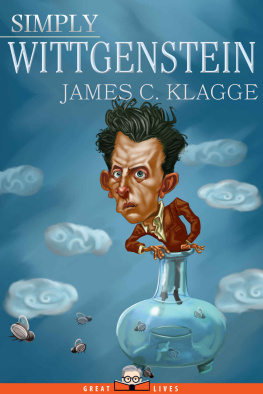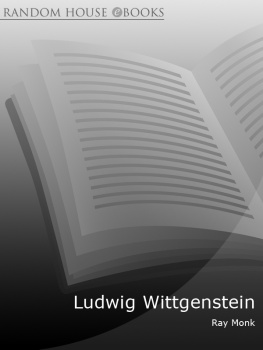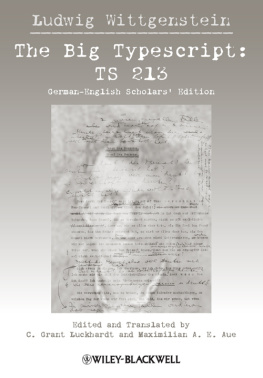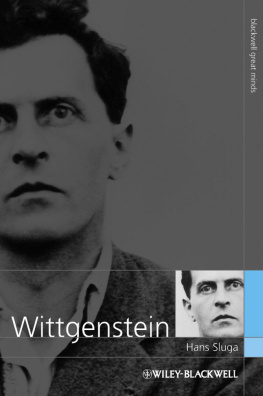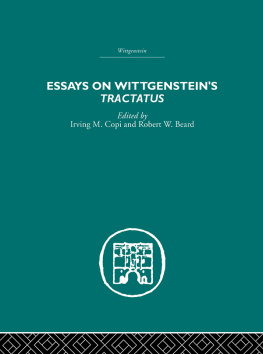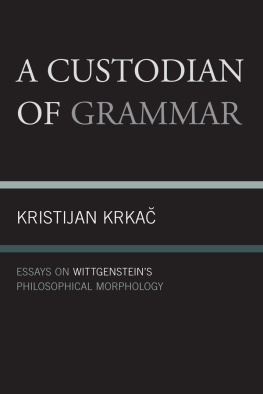Copyright 2016 by James C. Klagge
All rights reserved. No part of this publication may be reproduced, distributed, or transmitted in any form or by any means, including photocopying, recording, or other electronic or mechanical methods, without the prior written permission of the publisher, except in the case of brief quotations embodied in critical reviews and certain other noncommercial uses permitted by copyright law. For permission requests, write to the publisher, addressed Attention: Permissions Coordinator, at the address below.
1
Praise for Simply Wittgenstein
Professor Klagge gives us a birds eye view of the philosophy of one of the greatest thinkers of the 20th century. The book intertwines an accessible interpretation of Wittgensteins major works with the most relevant events in his life.
Mauro Luiz Engelmann, Professor of Philosophy, Federal University of Minas Gerais (UFMG), Brazil
There is no one more well-suited to walk us through Wittgensteins life and worktogether!than James Klagge, who has shown before how philosophy and biography cohere. In the case of Wittgenstein, where the ideas and the life-story are unique, mesmerizing, and enigmatic, Klagge makes the philosophy not only accessible, but even relevant and applicable to current, real-life issues.
Anat Biletzki, author of (Over)Interpreting Wittgenstein, Albert Schweitzer Professor of Philosophy, Quinnipiac University
This brief introduction to Wittgensteins life and work presumes no previous knowledge on the readers part. Yet Klagge shares with the reader little-known historical gems about Wittgensteins personal and intellectual life. Employing his extensive knowledge of Wittgensteins correspondence and other biographical resources, Klagge shows the reader what Wittgenstein was saying and writing to his friends at crucial points while developing his two major works: Tractatus and Philosophical Investigations. Klagges own views affect how he presents the themes in those works, of course, but even readers who have already formulated views on Wittgenstein are bound to enjoy some of the new angles and biographical anecdotes he presents. Klagges engaging, non-combative style and skill with an extensive array of biographical resources are to thank for this little book on Wittgenstein being so accessible and readable.
Susan G. Sterrett, Curtis D. Gridley Distinguished Professor of the History and Philosophy of Science, Wichita State University
James C. Klagges new book Simply Wittgenstein offers a concise and accessible overview of Wittgensteins central ideas in the two major periods of his philosophical activity. Focusing on Tractatus Logico-Philosophicus and the posthumous Philosophical Investigations, Klagge explains the motivations, structures, and contents of Wittgensteins primary texts. The compact study is simply about without oversimplifying Wittgensteins intrinsically complex lifework. Klagges study makes an excellent resource for philosophy students and other interested readers to gain competent, authoritative exposure to the essentials of Wittgensteins thought.
Dale Jacquette, Senior Professorial Chair in Logic and Theoretical Philosophy at the University of Bern, Switzerland
Simply Wittgenstein is a lucidly concentrated presentation of the main lines of thought in Wittgensteins two major works against the background of Wittgensteins equally fascinating biography. Biography is no mere embellishment of philosophy here but is sparingly and sagely employed to illustrate the character and quality of Wittgensteins mind. In effect, Klagge whets the readers appetite for the original texts rather than merely summarizing their content. As co-editor (with Alfred Nordmann) of the most comprehensive anthologies of Wittgensteins philosophical and personal writings in English as well as a teacher of undergraduates for some thirty years, he is superbly qualified for that task. At a number of points, he introduces examples of current dilemmas about questions like what is a presidential election? Or is the idea of God essential to religion that show the relevance of Wittgensteinian ways of thinking to contemporary conceptual conundrums. Throughout, Professor Klagge never loses sight of the sense of silent wonder as the prerequisite of genuine philosophizing that Wittgenstein sought to awaken in his readers.
Allan Janik, co-author of Wittgensteins Vienna and Honorary Professor of Philosophy at the University of Vienna
A tour de force. Not only does this accessible introduction offer a succinct, yet penetrating, understanding of the relation between Wittgensteins earlier and later philosophyincluding his evolving thoughts on the nature of language, logic, philosophy, and religionit treats the reader to a wealth of largely unknown biographical information. Demonstrating how Wittgensteins methodology might be brought to bear on philosophical and practical issues of concern today, James Klagge excels as philosopher, scholar and teacher to bring his subject to life. One of the few books I would recommend as a general introduction to the extraordinarily complex ideas of the greatest philosopher of the 20th Century. I learned a lot from it.
Dr. Julia Tanney, Philosopher, former Reader in Philosophy of Mind at the University of Kent
3
Series Editor's Foreword
Simply Charlys Great Lives Series offers brief, but authoritative, biographies of the worlds most influential peoplescientists, artists, writers, economists, and other historical figures whose contributions have had a meaningful and enduring impact on our society. Each book, presented in an engaging and accessible fashion, offers an illuminating look at their works, ideas, personal lives, and the legacies they left behind.

